-
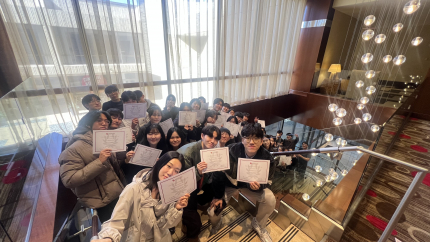
Exploring the Frontiers of U.S. Aerospace Innovation
The 2025 NASA–BOEING Exploration Program Successfully ConcludedThe 2025 NASA–BOEING Exploration Program, designed to explore the forefront of aerospace innovation in the United States, was successfully held from January 12 to 16. Organized annually by the Office of International Affairs during the winter break, the program aims to broaden students’ understanding of global corporations and institutions while nurturing future global leaders. This year’s program offered students a rare and meaningful opportunity to experience the aerospace industry firsthand. A total of 40 students participated, including 27 students selected by the Office of International Affairs and 13 team leaders and award recipients from the 2025 BOEING DAY program. The itinerary included visits to the University of Houston and NASA Johnson Space Center in Houston, Texas, as well as the Boeing Everett Factory and The Museum of Flight in Seattle, Washington. Stepping beyond the classroom, students encountered the real-world environments that drive the global aerospace industry, experiencing moments where theory and practice converged. The delegation arrived in Houston on January 12 and began the program at the Hilton University of Houston Hotel. The core component of the program—the Global Leadership Field Trip—was conducted over two days, from January 13 to 14. Newly introduced this year, the program at the University of Houston added greater depth and academic significance to the exploration. From Knowledge to Experience: Encountering Global Leadership Students engaged directly with local faculty through a series of lectures hosted by the Hilton College of Global Hospitality Leadership. Held over two days, these sessions enhanced the academic rigor of the program. Dr. Agnes Lee DeFranco delivered a lecture titled “Corporate Digital Responsibility: Code of Conduct and Best Practices in the Lodging and Club Industries,” while Dr. Minwoo Lee presented “AI Meets Service Management: AI-Powered Data Analytics.” The lectures examined corporate responsibility in an era of rapid technological advancement and explored the future of the service industry driven by artificial intelligence. Beyond acquiring knowledge, students gained a deeper appreciation for the importance of critical thinking and inquiry within a global industrial context. The sessions encouraged them to reflect on the intersection of technology and society and to consider their roles as future global professionals. ▲ NASA Johnson Space Center Following the lectures, students visited NASA Johnson Space Center, where they experienced the General Admission exhibits, the Apollo Mission Control Tram Tour, and the Historic Mission Control Tour. Walking through spaces that preserve the legacy of humanity’s journey into space, students felt the magnitude of space exploration and the countless challenges behind each achievement. Scenes once familiar only through textbooks and videos came vividly to life, inspiring awe and admiration. The Houston schedule concluded with a campus tour of the University of Houston, after which students received certificates of completion for the Global Leadership Field Trip. Despite the compact schedule, participants gained a profound understanding of what global leadership truly entails. ▲ Global Leadership Field Trip at the University of Houston Inside the World of Manufacturing: Aerospace Industry at Boeing On January 15, the group traveled to Seattle in preparation for their Boeing visit. The following day, a special VIP tour was arranged exclusively for the university’s students at the Boeing Everett Factory. As the largest aircraft manufacturing facility in the world, the factory’s vast scale and dynamic production environment left a lasting impression. Students observed the production lines of aircraft such as the B-777X, B-787 Dreamliner, and 767F, witnessing the entire aircraft manufacturing process up close. Seeing classroom concepts realized in real-world production settings provided a powerful and memorable learning experience. The students’ continuous questions reflected their strong academic curiosity and genuine interest in the aerospace industry. During the luncheon that followed, students met with Boeing employees and engineers from Korean Air. The professionals shared firsthand experiences and insights into the future of the industry, offering practical perspectives that strengthened students’ aspirations to pursue careers in aerospace. ▲ Just Boeing it The final stop of the program was The Museum of Flight. Tracing the evolution of aviation from its origins to the present day, students reflected on the depth of technological progress and the enduring human spirit of challenge and innovation. This visit served as a meaningful moment of reflection on the significance of the entire program. Park Ga-hyun (Class of ’23, School of Business Administration), the overall student leader, remarked, “It was incredibly meaningful to experience the aerospace industry in person, something I had previously only encountered through theory. Listening directly to professors at the University of Houston—especially lectures connected to my major—broadened my academic perspective and deepened my understanding of my field.” Lee Sang-yeop (Class of ’21, Department of Electronics and Avionics Engineering) shared, “This program allowed me to experience moments that are not easily accessible. Visiting the University of Houston, NASA, and Boeing was extremely helpful in shaping my career path and expanding my worldview. I am truly grateful to the university and the Office of International Affairs for providing us with this opportunity.” The NASA–BOEING Exploration Program offered students far more than an industry tour. It encouraged them to reflect seriously on their own potential and future paths. By engaging directly with world-leading institutions and corporations, students gained not only an understanding of technological advancement but also an appreciation for the responsibility and challenges embedded within it. Through lectures, site visits, and interactions with industry professionals, participants had the opportunity to contemplate the skills and mindset required on the global stage. More than a simple field trip, this program marked a meaningful starting point for students as they define their academic and career trajectories. These invaluable experiences were made possible through the university’s dedicated support, the efforts of the Office of International Affairs, and the warm hospitality of the University of Houston and partner institutions. The NASA–BOEING Exploration Program concluded by empowering students’ dreams and ambitions, leaving a lasting impact on the university’s journey toward cultivating global talent.
2026-02-09 -
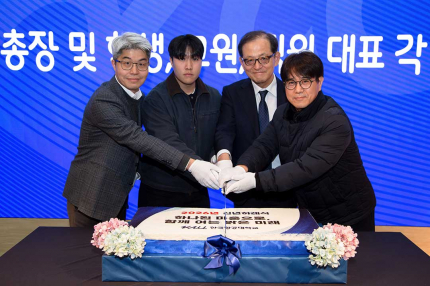
Korea Aerospace University Marks the Start of 2026 with New Year’s Ceremony
Korea Aerospace University (KAU) held its 2026 New Year’s Ceremony on the morning of January 5 at the university’s main auditorium, officially marking the beginning of the new year. Faculty and staff members gathered to exchange greetings and share the university’s mid- to long-term vision as well as key initiatives for the year ahead. Following university tradition, the ceremony began with participants exchanging handshakes and New Year’s well wishes. Members of the university community came together to greet one another, sharing the meaning of embarking on a new year collectively. The event then featured congratulatory video messages from distinguished guests, including Mayor Lee Dong-hwan of Goyang Special City, National Assembly Member Han Jun-ho, and President Lee Sang-cheol of the Korea Aerospace Research Institute. The speakers congratulated President Heo Hee-young on his reappointment and highlighted KAU’s role and achievements as a university closely connected to the aerospace industry. They also expressed hope that KAU would continue to play a meaningful role as a hub for aerospace research and talent development through collaboration with local communities, industry, and research institutions. In his New Year’s address, President Heo Hee-young shared his reflections on beginning a new term as the 10th president of the university. Looking back on the changes and achievements made over the past four years amid a rapidly changing higher education environment, he expressed his gratitude to faculty and staff for their dedication. He also reviewed key initiatives from his previous term, including campus environment improvements, academic structure reforms, institutional enhancements, and new projects. President Heo noted that these efforts have led to positive changes in campus culture, improved financial stability, increased admissions competitiveness, and higher student satisfaction. He emphasized that the rise in student satisfaction and renewed sense of pride among university members form an important foundation for strengthening KAU’s competitiveness. President Heo then outlined four strategic priorities for 2026. First, he emphasized curriculum reform to stabilize the flexible major selection system, aiming to realize meaningful interdisciplinary education through university-wide coordination following discussions at the college level. He also stressed the importance of educational innovation to proactively respond to AI-driven and digital transformation, as well as rapidly changing higher education environments. As the second priority, President Heo presented the vision of advancing into a global comprehensive aerospace university. He designated 2026 as a pivotal year for expanding global initiatives and announced plans to establish an internationalization task force to systematically enhance student exchange programs, joint research with overseas universities, and cooperation with international organizations. The third priority focused on expanding campus infrastructure. Addressing the increasing number of international students, trainees at aviation technology and safety education institutes, and the shortage of laboratory and practice spaces for graduate students, President Heo stated that the university would explore mid- to long-term solutions, including cooperation with local governments, to secure spaces suitable for education and research. Lastly, President Heo emphasized strengthening university promotion and external engagement to more effectively communicate KAU’s educational and research achievements and potential to academia, industry, government, and the international community. He also expressed plans to expand the university’s presence by actively supporting students’ participation in conferences, forums, competitions, and other external activities. Concluding his address, President Heo underscored that people are the university, noting that KAU functions properly only when professors, staff, and students each fulfill their roles. He also reaffirmed his commitment to continuously improving faculty and staff welfare. Following the New Year’s address, the ceremony continued with the introduction of senior administrators and a cake-cutting ceremony attended by the president and representatives of faculty, staff, and students, symbolizing unity and a hopeful start to the new year. After the event, commemorative rice cakes and gifts were distributed to attendees, and free tteokguk (rice cake soup) was served at the campus cafeteria during lunchtime, allowing all members to share in the spirit of the new year. The 2026 New Year’s Ceremony concluded as a meaningful occasion for the KAU community to reflect on past achievements, share future directions, and reaffirm their commitment to a new beginning together. Inaugural Address of the 10th President
2026-01-07 -
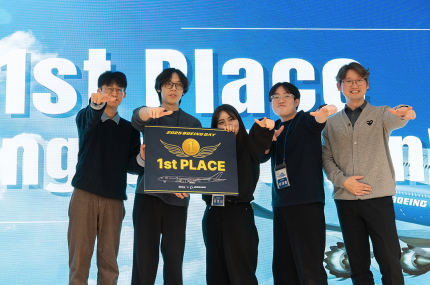
KAU and Boeing Host “Boeing Day 2025” to Foster Next-Generation Aerospace Talent
Boeing Day 2025, jointly hosted by Korea Aerospace University (KAU) and the global aerospace leader Boeing, was held on the afternoon of November 26 at the Vision Hall on campus. Celebrating its 12th year since launching in 2014, Boeing Day has established itself as a major event dedicated to nurturing future talent in the aerospace field, featuring special lectures by Boeing Korea e x e cutives and a student idea competition.During the opening ceremony, Will Shaffer, President of Boeing Korea, delivered a congratulatory message via video. He remarked, “Boeing Day has become a hub for creativity and collaboration, and we have high expectations for the innovative ideas and challenges that KAU students will bring to the future of aerospace.”KAU President Hee-Young Hur expressed gratitude for Boeing’s continued support, saying, “I hope this competition serves as a valuable opportunity for students to explore diverse challenges in the aerospace era and to develop creative thinking and a spirit of innovation.”Following the remarks, Alain Garcia, Head of the Korea defense division for Boeing Defense, Space & Security (BDS) and Boeing Global Services (BGS), delivered a keynote lecture on current technological trends in the aerospace and defense industry.This year’s student idea competition was held under the theme:“(Celebrating the 75th anniversary of the Korea–Boeing partnership) Innovative next-generation aerospace technologies to counter unpredictable threats—from air to space.” Participants proposed a wide range of ideas, exploring possibilities such as next-generation mobility safety, survival and operation technologies in space environments, and designs for future aerospace infrastructure. A total of 49 teams entered the competition, with 11 teams advancing through two preliminary rounds to participate in the final presentations and exhibition.Boeing Korea employees also took an active role, offering in-depth guidance during mid-term reviews. Ten Boeing employees served as final judges, providing industry-based feedback on technical feasibility, implementability, safety, and more.The grand prize went to Team AC/DC, composed of students Se-Hyung Lee, Sang-Jun Lee, Tae-Hoon Kang, and Young-Seo Yoo. The 1st–3rd place teams were awarded scholarships and the opportunity to join the “NASA–Boeing Exploration Program,” which includes visits to the Boeing Factory in Everett, Washington; NASA space facilities; and the University of Houston. Scholarships were also awarded to the 4th–6th place teams.KAU continues to strengthen students’ creativity, problem-solving ability, and global communication skills by jointly operating extracurricular programs each year with Boeing and Airbus—two of the world’s foremost aerospace and defense companies—turning students’ innovative ideas into real-world outcomes.
2025-12-04 -
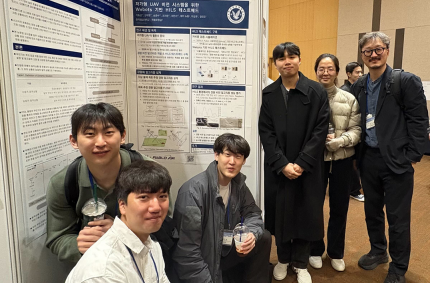
KAU’s KABLO Team Wins Grand Prize at the 2025 SW Talent Festival
The KABLO team of the SW·AI Education Center at Korea Aerospace University (KAU) won the Grand Prize at the 2025 SW Talent Festival Outstanding Project Competition. The event was hosted by the Ministry of Science and ICT and jointly organized by the Institute of Information & Communications Technology Planning & Evaluation (IITP) and the SW-centered University Council. Students from 58 SW-centered universities nationwide participated to showcase software- and AI-based innovations. The festival was held on November 27 at Seoul Dragon City in Yongsan, Seoul. The KABLO team received the top award for developing a vision-based guidance and control technology for low-cost unmanned aerial vehicles (UAVs) and a testbed utilizing Hardware-in-the-Loop Simulation (HILS), which integrates real hardware with software for testing. The technology was highly praised for enabling precise flight control without expensive equipment and allowing experiments in a safe, realistic environment. Vision-based guidance and control uses vision sensors such as cameras to recognize the surrounding environment and autonomously adjust the flight path—an essential field in autonomous flight research. By integrating this technology with a HILS environment, the KABLO team established a foundation for validating control algorithms directly under realistic conditions. This approach was evaluated as significantly reducing risks during development and testing, improving experimental efficiency, and expanding potential industrial applications. The award-winning team consists of students Ho-Seon Gi, Dae-Won Kang, and Min-Seo Choi from the Department of AI Autonomous Systems Engineering; Jun-Su Song from the Department of Software; and Ja-Woon Cho from the Aviation Transportation major. Under the guidance of Professor In-Mo Jang, the team successfully combined aerospace engineering and software capabilities to produce a practical and impactful outcome. Since being selected as a SW-centered University in 2021, Korea Aerospace University has strengthened specialized software education and research in the aerospace field and has continued to foster industry-ready SW talent. This achievement is considered a strong example of the university’s advancing education and research system.
2025-12-04 -
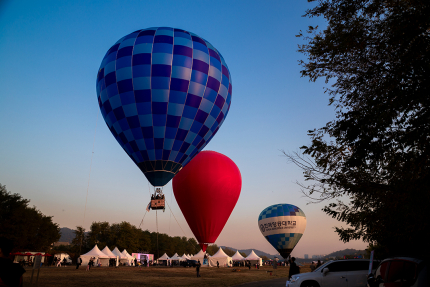
The 2nd Korea Aerospace University Aircraft Runway Festival Successfully Concluded
Our university held the 2nd Aircraft Runway Festival on November 7–8 at the Aircraft runway beside the campus, decorating the autumn sky together with citizens. Themed “The Way to the Sky,” this festival opened the Aircraft runway—normally off-limits to the public—to citizens, offering a rich variety of aviation-leisure experiences, exhibitions, and performances as an aviation-culture festival. Centered around our university, the event also involved the army, corporations, local resident organisations and regional companies—adding significance as a “regional co-prosperity festival” where the university and region soar together. The festival was hosted by our university, and supported by Goyang Special Self-Governing City, Korea Airports Corporation, Incheon International Airport Corporation, Korea Airport, and ten airlines including Korean Air, Asiana Airlines, Jin Air, Jeju Air, Air Busan, Eastar Jet, Air Seoul, Aero K, Air Premia, and Air Korea. The Saturday event began with a ride-on experience aboard the KUH‑1 Surion helicopter of the army. The Surion helicopters, carrying spectators who successfully made prior reservations, circled the Aircraft runway at regular intervals to mark the opening of the festival. A powered paragliding demonstration also captured the audience’s attention, and a variety of performances—including a military band, honor guard and special forces martial arts team—added to the enjoyment. The hot-air balloon and Surion helicopter experiences were the highlights of the festival. From the balloon slowly ascending into the sky, the view of the campus and the city of Goyang below left an unforgettable impression on citizens. The Surion helicopter ride was met with high interest as well—reservations closed within less than a minute. At the experience zone set up beside the Aircraft runway, a variety of aerospace-themed programs were operated — flight simulator experiences, solar-observation, model-making, aviation board games — drawing families of visitors. Displays of the army’s helicopters, tanks and armored vehicles also continuously attracted citizens’ attention. In the later part of the event, programs that allowed direct citizen participation followed. The aviation-leisure OX quiz competition provided a time to learn about aviation knowledge together, and the egg-d r o p challenge saw cheers each time a family-built d r o p device landed safely. One visitor who came to the event said, “We walked on the Aircraft runway, which normally isn’t accessible, and tried flying a model aircraft—the child was very amazed. There were so many programmes that families could enjoy together, so the day passed in a flash.” Another attendee said, “It was impressive that Korea Aerospace University created a space open to local residents. I want to visit again next year.” Meanwhile, during the festival period the Ministry of Land, Infrastructure and Transport hosted the “1st Aviation Leisure Industry Job Fair”. Over 60 organisations from the aviation-leisure sector — private companies, public corporations and educational institutions — took part, offering one-on-one career and recruitment counselling, employment lectures and keynote speeches, alongside on-site recruitment booths and an aviation job & leisure information centre.
2025-11-13 -
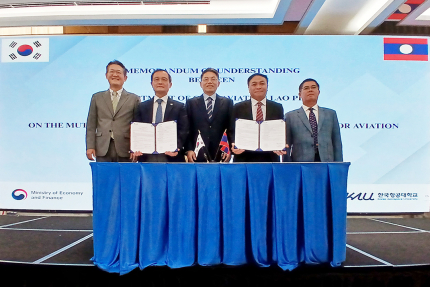
Korea Aerospace University Signs MOU with the Department of Civil Aviation of Laos to Establish Aviation Safety and Pilot Training System
Korea Aerospace University (KAU) signed a Memorandum of Understanding (MOU) with the Department of Civil Aviation of the Lao PDR (DCAL) on October 16 at the DoubleTree Hotel in Vientiane, Laos. The agreement aims to establish a training system for aviation safety inspectors and pilots. This MOU is one of the key outcomes of the 2024–2025 Knowledge Sharing Program (KSP) project titled “Improvement of the Aviation Operation System at Luang Prabang International Airport (Phase II).” It represents a significant step toward strengthening the institutional foundation and human resource capacity of the Lao aviation industry. Professor Jang-Ryong Lee, Head of the Aviation Safety Center at KAU, signed the agreement on behalf of President Hee-Young Heo. On the Lao side, Mr. Khamla Phommavanh, Director General of the Department of Civil Aviation, also signed the MOU. The ceremony was attended by officials from both organizations, as well as representatives from the Embassy of the Republic of Korea in Laos, KOTRA headquarters, and the KOTRA Vientiane Trade Office. Through this MOU, both parties agreed to collaborate on: - Establishing education and training systems for aviation safety inspectors and pilots - Jointly developing training materials and evaluation tools - Conducting feasibility studies for establishing aviation education institutions - Linking the project with ODA cooperation funds in partnership with the Ministry of Land, Infrastructure and Transport (MOLIT) and related organizations In particular, KAU will support the operation of an aviation safety inspector training program aligned with ICAO standards and introduce a “Train the Trainer” course to help Laos build a self-sustaining education system.The two institutions will also develop a “Zero Time to Airline” pilot training program to ensure a stable supply of flight personnel and promote the modernization of aviation education infrastructure, contributing to the sustainable growth of the Lao aviation industry. Under the agreement, the two organizations will form a joint working group for the next five years to develop a detailed work plan and monitor implementation in collaboration with the KOTRA Vientiane Trade Office.
2025-10-27 -
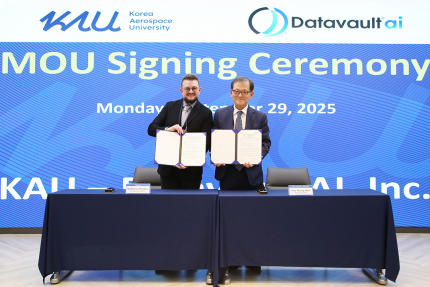
Korea Aerospace University Signs MOU with Datavault AI to Introduce Blockchain-Based Digital Badge System
Korea Aerospace University (KAU) signed a Memorandum of Understanding (MOU) with Datavault AI, a U.S.-based data technology company, on September 29 at the Vision Hall on campus. Under the agreement, the two institutions will collaborate to introduce and utilize a Digital Badge solution based on blockchain and artificial intelligence (AI) technologies. They also agreed to promote cooperation in a wide range of areas, including faculty and student exchanges, joint research, and academic conferences. The Digital Badge is a type of electronic certification that digitally records an individual’s learning experiences—including curricular, extracurricular, and qualification achievements—and secures them with blockchain technology to prevent forgery or tampering. Recently, universities and organizations around the world have begun using digital badges to safely manage and share learning histories and to support students’ career development and employment opportunities. Through this partnership, KAU plans to introduce Datavault AI’s blockchain-based “VerifyU” solution and establish a digital learning record certification system on campus. This initiative aims to help students systematically manage their achievements, strengthen career development support, and enhance the university’s global competency certification framework. Datavault AI, headquartered in Beaverton, Oregon, is a NASDAQ-listed company that provides platforms for data tokenization, authentication, and monetization using AI, blockchain, and acoustic science. The company holds more than 670 registered and pending patents worldwide and continues to expand partnerships with universities through its blockchain-based digital badge solution, VerifyU.
2025-10-27 -
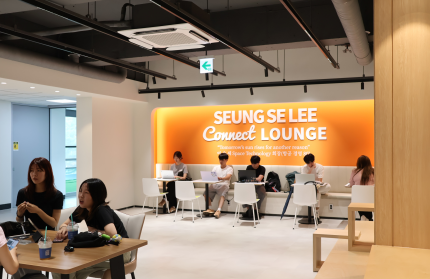
Student u n i o n Building Reopens After Renovation for the New Semester — Students Look Forward to a Stronger Campus Community
*{margin:0;padding:0;} .brochure_list {display:flex; flex-flow:row wrap; justify-content:space-around;border:none;} .brochure_list img{width: 31%;margin:10px 1%;} @media (max-width: 768px) { .brochure_list img{ width: 47.5%; } } @media (max-width: 500px) { .brochure_list img{ width: 100%; } } } After two months of renovation work during the summer vacation, the Student u n i o n Building has been completely revamped. Revealed at the start of the fall semester, the newly renovated building was redesigned to offer comfortable lounge areas and improve facilities such as student council offices and club rooms. As this building serves as a central hub for Korea Aerospace University (KAU) students, expectations for the transformation are high. Let’s take a closer look at the major changes and student reactions. ○ Renovations on the 2nd and 3rd Floors: What’s New?On the second floor, the layout has been significantly restructured. The former spaces — including departmental student council rooms, a women’s lounge, and a ping-pong area — have been replaced with a modern study lounge. Notably, the “Seung-Se Lounge,” funded by KAU alumnus Seung-Se Lee (Class of '80, Aviation Business), quickly became a popular spot among students during the first week of the semester.This lounge offers group tables ideal for discussions as well as individual study seats reminiscent of a café. In addition, new multi-purpose and seminar rooms have been added to make collaborative assignments and research more convenient. The student council rooms, which were previously organized by department, are now grouped by college — including the College of Liberal Studies, College of Aviation Business, College of Engineering, and College of AI Convergence. These spaces are available not only for student representatives but also for general student use. On the third floor, the space has been restructured to house 34 club rooms, media organizations, performance and sports practice rooms, the international student council room, and a shared storage area. The relocation of the athletic club rooms to the third floor freed up the second floor to better serve students. One of the most welcomed changes is the installation of air conditioning systems in all club rooms. Soundproofing has also been improved in performance-related rooms, and a new café-style lounge has been added near the eastern staircase. ○ New Look Inside and Out: Exterior RenovationThe renovation wasn’t limited to the interior. The Student u n i o n Building’s exterior — previously compared to dull 1990s government buildings — also received a bold upgrade. The new design features a clean gray base with accents of orange and blue, creating a fresher, more vibrant impression. Practical upgrades were also made outside. The open-air theater between the Student u n i o n and the A300 airplane has been converted into a comfortable terrace space with tables, chairs, and a canopy. This previously underused area is now a pleasant outdoor spot for students and faculty to gather, significantly increasing the utility of campus space. ○ Surprise Makeover: Engineering, Electronics, and Science Buildings Alongside the Student Union, the Electronics, Mechanical, and Science Buildings — long criticized for their outdated appearances — also received a surprise facelift. All three were repainted in a modern gray tone, matching the new Student u n i o n style. Additionally, a large "KAU" logo in navy, the university's official color, was added to the front of the Mechanical Engineering Building, creating a strong visual identity that pairs well with the nearby Hangtral Park. The bulletin board area between the Electronics Building and Student u n i o n was also revamped. Previously a narrow and underutilized passage, it has been expanded into a more open plaza-like space. Students now have a reason to pause and check announcements, making the bulletin board a more effective communication tool — much like those in other universities. ○ What Do Students Think? Students have largely responded positively to the renovation while offering constructive feedback. Jo Hyun-woo (Class of ‘23, Aviation Operation) shared, “Thanks to this beautiful renovation, I feel more motivated to study, and I’m proud to leave such a great facility to future students. I wish Korea Aerospace University continued success.” His classmate Lee Dong-wook (Class of '23) added, “I used to find it inconvenient to walk all the way to the library during breaks. Now, with the new lounges on the 2nd and 3rd floors, it’s much more comfortable to relax or study after meals. I’m very pleased with the upgrade.” Survey results showed an average satisfaction rating of 3.9 out of 5. Specific scores included: - Study Spaces (e.g., Seung-Se Lounge, Study Zones): 4.2 - Interior Facilities (e.g., AC, blinds, soundproofing): 3.7 - Additional Facilities (e.g., terrace near A300, bulletin board area, KAU logo): 3.9 Open responses highlighted positive changes such as a “brighter campus atmosphere” and “improved heating, cooling, and sound insulation.” However, some students also voiced concerns, including: - Reduced space for athletic clubs - Privacy issues due to too many glass walls - Inconsistent Wi-Fi in some areas - Lack of transparency in club room assignments - Smaller club room sizes and limited rest areas Despite mixed opinions, most students appreciated the more pleasant and convenient environment. As long as student feedback continues to be taken seriously, the Student u n i o n Building is expected to become the heart of campus life at KAU.
2025-09-11 -
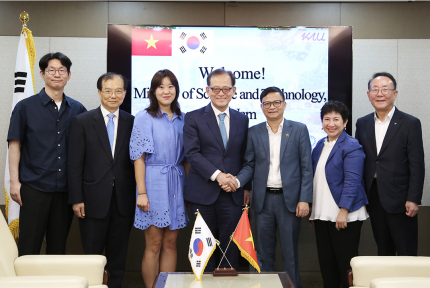
Vietnamese Vice Minister Visits Korea Aerospace University to Discuss Future Cooperation
On August 13, Duc Nghiem Pham, Vice Minister of Science and Technology of Vietnam, visited Korea Aerospace University and met with President Hee-Young Hur to discuss opportunities for cooperation between Vietnam, Korea, and the university. The visit was arranged to explore potential collaboration in various fields of science and technology, including aerospace, with a focus on joint research, talent exchange, and technology cooperation. From KAU, President Hur was joined by Distinguished Professor Jin-Sang Lee and Director of International Affairs Woon-Kyung Song. Representatives from Korean companies such as AT Pharma, Samduk Electric, and Cosmo Electric also attended, sharing ideas on possible industry-academia partnerships and future international joint projects. President Hur expressed his hopes by saying, “Through this meeting, I look forward to Korea and Vietnam jointly fostering outstanding talents in aerospace and science and technology, and achieving meaningful outcomes together.” Vice Minister Duc Nghiem Pham responded, “Vietnam has been increasing its investment and interest in science and technology, including the aerospace industry. I hope today’s meeting will serve as a meaningful starting point for concrete cooperation.” Building on this discussion, Korea Aerospace University plans to strengthen its international cooperation network with Vietnam and the broader Southeast Asian region, while enhancing its global competitiveness through joint research and talent exchange.
2025-08-25 -
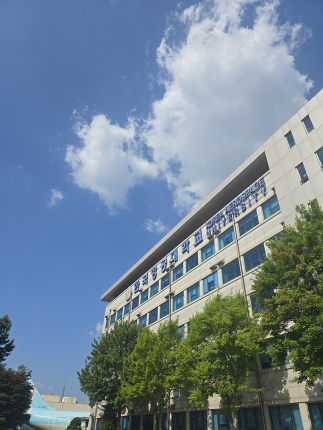
KAU Earns Top Ratings in the 2025 University Innovation Support Project Evaluation
Korea Aerospace University (KAU) has achieved the highest ratings in both evaluation categories of the 2025 University Innovation Support Project Performance Evaluation, organized by the Ministry of Education and the National Research Foundation of Korea. The university received an S grade in the Education Innovation Performance category and an A grade in the Internal Performance Management category. Notably, KAU maintained the top S grade for Education Innovation Performance for the second consecutive year, following 2024, highlighting its sustained commitment to educational innovation. As a result, the university will receive approximately 2.4 billion KRW in additional incentives. This success was driven by a wide range of innovation initiatives, including: Full implementation of the Flexible Major Selection System Expansion of students’ choice of majors in line with demand Reduced credit burden through academic system reforms Establishment of customized career and academic support systems Restructuring of liberal arts and general education programs Enhanced communication with university members In particular, the full adoption of the Flexible Major Selection System has been recognized as an excellent case of providing students with broader career opportunities and greater curricular flexibility. The University Innovation Support Project is a government funding initiative designed to support universities’ autonomous innovation and structural reforms. It aims to nurture convergent talents for future society and respond to demographic changes by supporting curriculum reforms, structural adjustments, and improvements in educational environments. Each university carries out projects based on self-designed development plans, and the performance evaluation comprehensively reviews whether these plans have effectively enhanced educational quality and student competencies. In addition to this achievement, KAU has also been selected for several other major national initiatives in 2024, including the Regional Innovation-led University Support System (RISE), the BK21 Four Program for fostering innovative talent, and the Aviation and Drone Innovation Convergence University Project. Through these accomplishments, KAU continues to strengthen its position as a future-oriented innovative university with balanced excellence in both education and research.
2025-08-25 -
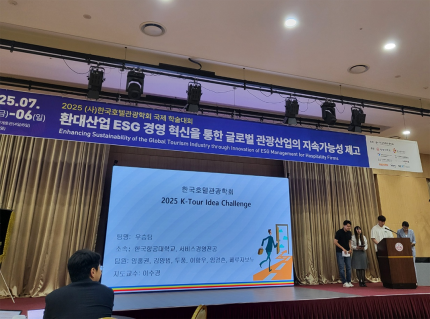
KAU International Students Win Encouragement Award at 2025 K-Tour Idea Challenge
A team of six international students from the Department of Service Management under the School of International Studies at Korea Aerospace University (Lim Hong-gwon, Kim Yang-beom, Du Feng, Li Hangyu, Pelzabonuu, and Lin Juehen) received the Encouragement Award at the 2025 K-Tour Idea Challenge, hosted by the Korea Hotel and Tourism Association. The competition was held as a side event of the 2025 AKHT International Conference in Seoul, Korea, which took place from July 4 to 6 at Sejong University. Under the theme "Enhancing the Sustainability of the Global Tourism Industry through ESG Management Innovation in the Hospitality Sector," the event brought together scholars and students from Korea and abroad to share and exchange ideas. KAU’s team was the only group of finalists composed entirely of international students. Their proposal, titled "The King’s Road & Sky Road: The Majesty of Joseon and the Dream of Korean Aviation," presented a time-integrated tourism concept connecting the traditional cultural heritage of Goyang City—where KAU is located—with the university’s advanced aviation resources. The proposed tourism course organically linked historical sites such as Seooreung Royal Tombs, Heungguksa Temple, and Haengju Fortress, which embody the spirit of the Joseon Dynasty, with cutting-edge aviation landmarks such as the Goyang Drone Anchor Center, Aerospace Museum, Chang-gong-ho training aircraft, and a full-scale A300 airplane located on campus. The plan included three hands-on themed experiences specifically designed for international visitors. Notably, the students incorporated the symbolism of Obangsaek, Korea’s traditional five-color system, to organize their roles in planning, research, content development, and presentation. They conducted on-site visits and evaluated the attractions from the perspective of foreign tourists. Their participatory, storytelling-based tourism model earned high praise for its originality and depth, particularly for reinterpreting Korean tourism through a global lens, while overcoming language barriers and demonstrating cultural sensitivity. Professor Lee Soo-kyung, who advised the team, commented, “The process of international students discovering local assets and transforming them into tourism content was not only an academic exercise but also a meaningful experience for developing intercultural understanding and a global mindset.” She added, “We will continue to support students’ participation in diverse domestic and international competitions to help broaden their perspectives.”
2025-07-30 -
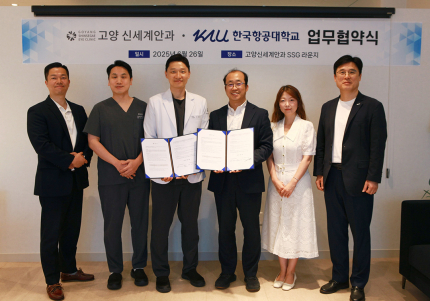
Korea Aerospace University Signs MOU with Goyang Sinsagae Eye Clinic to Enhance Medical Welfare Services for University Members, Including International Students
On June 26, Korea Aerospace University (KAU) signed a Memorandum of Understanding (MOU) with Goyang Sinsagae Eye Clinic to strengthen medical welfare services for its students, faculty, and staff, while also promoting mutual development between the two institutions. The signing ceremony took place at the SSG Lounge on the 4th floor of Haengsin Square in Haengsin-dong, Goyang Special City. Attendees from KAU included Prof. Hwang Wan-sik, Dean of Student Affairs, Prof. Song Mi-kyung, Dean of the Institute of Lifelong Education, and Mr. Yoon Kwang-nam, Head of the Student Support Team. Representing the clinic were Dr. Ahn Jong-ho, Dr. Min Jun-ki, and Mr. Han Byung-jun, Head of Planning and Operations. Under this agreement, both institutions will collaborate in several areas, including: Organizing eye health seminars, Providing convenient and quality ophthalmic services for university members, Offering discounts on aviation medical checkups, Improving access to facilities such as the Aerospace Museum and the interior of the A300 aircraft. This partnership is particularly beneficial to international students, who will now have access to tailored eye care services, facilitating both their health management and smoother adjustment to life in Korea. Prof. Hwang remarked, “This agreement not only enhances the welfare of our university members, but also represents a meaningful step toward cooperation with local medical institutions. We will continue to develop practical support measures so that all students, faculty, their families, and especially our international students, can enjoy wide-ranging benefits.” Dr. Ahn, Director of Goyang Sinsagae Eye Clinic, stated, “We are pleased to offer high-quality eye care services to the KAU community through this partnership. We are committed to providing accurate diagnoses and compassionate care that international students and all our visitors can trust.” With this MOU, the overall quality of medical welfare services available to the KAU community is expected to improve significantly, helping both Korean and international students enjoy a healthier and more supportive campus experience.
2025-07-15 -
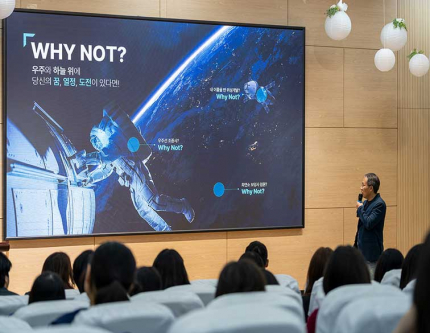
Over 1,800 Students Attend Admissions Info Sessions at 23 Schools in Asia
During the first half of this year alone, Korea Aerospace University’s Office of Admissions visited 23 overseas Korean and international schools across Southeast Asia, China, and Japan, meeting with over 1,800 prospective students and parents. To strengthen outreach to overseas Koreans and expand its global network, the university increased the number of participating schools by seven compared to last year. Held under the slogan “Why Not?”, the sessions introduced the university’s strengths in the aerospace field and provided key admissions information. A major focus was the Flexible Major Selection System, newly implemented for the 2024 incoming class, which allows students to explore various disciplines during their first year and choose their major in the second year. Attendees also received comprehensive guidance on KAU’s academic and research infrastructure, campus life, career opportunities after graduation, and admissions procedures. For schools that could not be visited in person, the university held separate online sessions. One-on-one consultations were also offered after each session to address individual questions and concerns. KAU further developed strong networks with school administrators and college counselors, ensuring ongoing collaboration and information sharing. Following the reform of the admissions schedule for overseas Korean students in 2024, KAU continues to expand its on-site admissions outreach. A university representative noted, “Overseas Korean students with global perspectives are a strong match for our university, which specializes in aerospace studies. We will continue these visits to attract talented students from around the world.” The first application round for the 2026 academic year (Overseas Korean Special Admission) will be held from July 7 to 11, covering the full curriculum track, 3-year track, and North Korean defector track. The second round is scheduled for September. Detailed guidelines are available on the KAU admissions website, and further inquiries can be directed to the Admissions Team at admission@kau.ac.kr or +82-2-300-0229.
2025-07-07 -
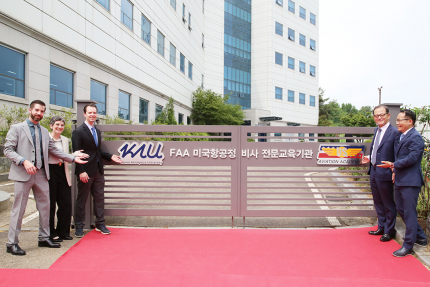
Korea Aerospace University’s Aircraft Technical Education Center Becomes the First in the World to Offer the FAA Aircraft Mechanic Certification Program Outside the U.S.
Korea Aerospace University (KAU)’s Aircraft Technical Education Center has launched a groundbreaking program that allows students to earn both the U.S. Federal Aviation Administration (FAA) aircraft mechanic certification and the Korean aircraft maintenance license. This marks the first time the FAA aircraft mechanic certification program is being offered outside the United States. To support the new program, KAU has installed FAA-compliant training equipment in its on-campus hangar and introduced a new Learjet aircraft for hands-on practice. The university also plans to adopt immersive VR and AR-based training technologies in the near future. On June 24, KAU held an official plaque unveiling ceremony at the back entrance of the International Education Building, recognizing the university as an authorized FAA training provider. The event was attended by KAU President Heo Hee-Young, General Affairs Director Choi Byung-Kwon, Flight Education Center Director Kim In-Kyu, Aircraft Technical Education Center Director Kim Sung-Gil, and Deputy Director Kim Jong-Bok. From the U.S. Aviation Academy (USAA), CFO Justin Sykes, Director of Development Scott Sykes, and Education Director Stormy Sykes were also in attendance. USAA is the largest FAA-certified aviation training organization in the United States, with 12 campuses and over 200 aircraft. It trains approximately 1,700 pilots and mechanics annually and maintains strong partnerships with major industry players, including Delta Air Lines and StandardAero—the world’s leading aircraft engine maintenance provider. USAA signed a partnership agreement with KAU in 2022, selecting it as its first strategic partner in Asia. The jointly operated FAA program spans one year, with six months of training at KAU and another six months at USAA’s Dallas campus in Texas. Upon completing both theoretical and practical components, students will be eligible to take the FAA certification exam and the Korean licensing exam. Graduates will have access to internship and employment opportunities in countries including the U.S., Japan, and Singapore. President Heo Hee-Young stated, “It’s a great honor for Korea Aerospace University to host the FAA aircraft mechanic program. I look forward to this partnership with USAA paving the way for KAU to become a central hub for aviation professionals in Asia.” Justin Sykes, CFO of USAA, added, “We’re thrilled to partner with KAU to launch the first FAA aircraft mechanic program outside of the U.S.” Following the ceremony, Scott Sykes gave a special lecture at KAU’s Vision Hall on the topic “FAA Aircraft Mechanic Certification and Global Internship Opportunities.” More than 200 students—including those from the Aircraft Technical Education Center, the Aviation MRO program, and international students—attended the session, showing strong interest in global careers in aircraft maintenance. About the FAA Aircraft Mechanic Certification This professional license authorizes the holder to inspect, repair, and approve airframes and powerplants. It is a legal requirement for practicing aircraft mechanics in the United States.
2025-06-25 -
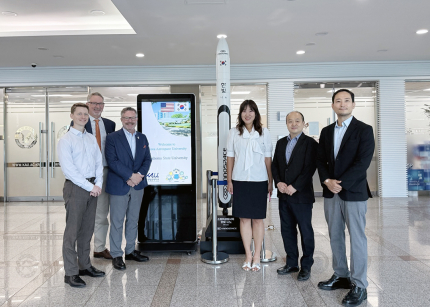
Oklahoma State University Delegation Visits Korea Aerospace University to Discuss Expansion of International Programs and Aerospace Research Cooperation
A delegation from Oklahoma State University (OSU) visited Korea Aerospace University (KAU) on June 17 to explore opportunities for expanding international exchange programs and enhancing research collaboration in the aerospace field. OSU is a public comprehensive university located in Stillwater, Oklahoma, and is ranked among the top public universities in the U.S. by U.S. News & World Report. It is particularly strong in aerospace engineering, agricultural sciences, business, and education, with a total enrollment of approximately 24,000 students as of 2019. The university is highly active in global education and research collaboration. KAU representatives, including Dr. Song Woon-Kyung (Director of the Office of International Affairs), Dr. Park Jin-Woo (Head of the School of International Studies), and Dr. Na In-Gi (Professor, School of International Studies), welcomed the delegation. The OSU delegation included Dr. Randy Kluver (Vice Provost and Dean of Global Studies), Dr. Jeffrey Simpson (Associate Dean for Global Partnerships), Dr. Samuel Ball (Director of the Center for Global Learning), and Ms. Soo Jung Kim (Coordinator for International Student and Scholar Services). The OSU delegation expressed strong interest in KAU’s specialized aerospace education and research capabilities. They held in-depth discussions on potential joint research opportunities, particularly in the fields of aerospace and unmanned aerial systems, which OSU has strategically prioritized. The delegation also indicated its intent to position KAU as a strategic partner in Asia for international collaboration and agreed to explore long-term cooperation based on industry-academic linkages. OSU also showed great interest in sending their students to KAU’s annual International Summer Program (ISP) as part of efforts to expand global learning opportunities. The delegation, h a v i n g been introduced to ISP by Dr. Jamey Jacob, Director of the Oklahoma Aerospace Institute for Research and Education (and former faculty at Purdue and Embry-Riddle), viewed the ISP as a starting point for gradually developing student exchange programs between the two institutions. Both universities agreed to develop concrete plans for OSU student participation in the 2026 ISP. They also discussed broader student exchange initiatives in cooperation with OSU’s partner institutions, including Embry-Riddle Aeronautical University and the University of North Dakota. The OSU delegation emphasized that the visit marks a significant step in building a long-term partnership for international research and talent exchange. KAU likewise plans to further strengthen its foundation for global aerospace cooperation and international education through expanded collaboration with OSU.
2025-06-19 -
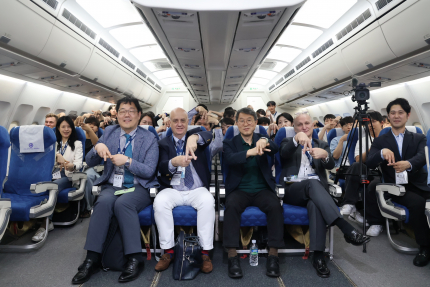
Fly high, Dream high! ... 2025 AIRBUS 101
On June 5, Korea Aerospace University (KAU) and Airbus Korea successfully co-hosted the 2025 AIRBUS 101 event. Since 2017, KAU—a university specializing in aerospace—and Airbus, a leading European aircraft manufacturer, have jointly organized this event as an extracurricular program aimed at fostering integrated thinking and innovative capabilities in the aerospace industry. AIRBUS 101 is an annual competition under the theme of “Innovative Ideas for Airlines and Aircraft Manufacturers.” It invites students to explore creative and practical solutions for the sustainable development of the aviation industry—including manufacturing, airlines, airports, and related sectors—from engineering, business, and interdisciplinary perspectives. Students work in teams to analyze industry-wide challenges and propose viable solutions, gaining valuable hands-on experience in the aerospace field. This year’s event began with an opening ceremony and guest lectures by Airbus employees held inside the Airbus A300-600 aircraft located on the KAU campus. In the second part of the event, held in the university auditorium, participating teams presented their ideas and engaged in a talk session with Airbus staff. Notable attendees included Airbus employees Robert Lindsay (Head of Training Services), Eric Cursan (Field Service Manager), Jimmy Lee (Field Service Representative), Karen Ko (e x e cutive Assistant), Seyoung Park (Innovation & Sustainability Development), and Ayeong Choi (Intern, KAU student), along with KAU professors Hwang Wansik, Kim Byungkyu, Jang Daesung, Song Woonkyung, Kim Hyunmi, Kim Hyunah, Park Yujin, Lee Sanghak, and Jang Inmo, as well as event advisors Professors Kim Kwangeun and Park Suhyun. Airbus staff judged the team presentations based on creativity, feasibility, completeness, and delivery. First place was awarded to the team “Let’s Live on Advanced Materials” (Park Jihwan, Kang Junwoo, Kim Jungwon, Lee Hyunjae) for proposing an energy harvesting system using diverse materials on airport runways. Second place went to “Airvolution” (Nam Siwoong, Oh Daegyo, Won Jonghoon, Na Jese) for developing a smart overhead bin capable of fire suppression. Third place was awarded to “AIRgorithm” (Kang Seongwoo, Na Yeonsu, Son Jina, Jeong Wooyoung) for proposing an AI-based collision avoidance system between landing aircraft and ground vehicles. Now in its ninth year, the 2025 AIRBUS 101 event offered participants meaningful opportunities to broaden their understanding of the aerospace industry and explore career paths. Through this event, students explored real-world innovation challenges and gained practical insights through interaction with Airbus professionals. We extend our sincere thanks to Korea Aerospace University and Airbus Korea for their generous support and look forward to seeing AIRBUS 101 continue to serve as a valuable platform for nurturing future leaders in the aerospace industry.
2025-06-13 -
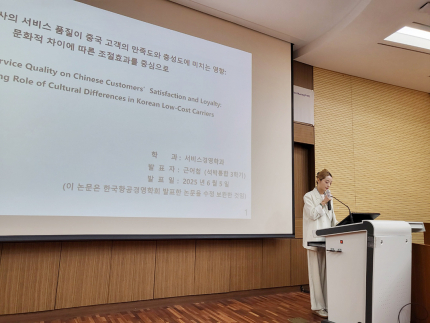
Department of Service Management Hosts the 3rd KAUSM Academic Conference
The Graduate School’s Department of Service Management held the 3rd KAUSM (Korea Aerospace University Service Management) Academic Conference on June 5 at the Aerospace Center. This regular event, held each semester, is one of the department’s flagship programs designed to strengthen the global research capabilities of international students and promote academic exchange. This year’s conference saw a record-high participation of 20 students, including international students from Uzbekistan, marking the largest turnout in the department’s history. Participants selected research topics and developed research models over the course of the semester, ultimately presenting high-quality research outcomes through a structured process.The department has also provided continuous support to help international students balance Korean language learning and academic research, enabling their steady involvement in the program. The presentation topics covered a wide range of key issues in the field of service management. Subjects included: job stress and job satisfaction; service quality and customer loyalty; consumer behavior and marketing effectiveness; cabin safety and passenger experience; and factors influencing airport choice and shopping behavior—spanning both practical and theoretical areas of study. The event also featured a moment to foster a sense of belonging within the department community. International students had the opportunity to experience warm aspects of Korean culture by sharing traditional rice cakes and refreshments prepared as a special welcome by the department.Undergraduate students who attended the event showed great interest in the graduate-level research presentations by their seniors, gaining inspiration and motivation to pursue further academic studies. In addition to hosting this on-campus academic conference, the Department of Service Management at Korea Aerospace University has actively participated in various external academic events—such as the Korean Association of Aviation Management, the Korean Society for Aviation Operation, and the Korean Association of Production and Operations Management—accumulating research achievements and strengthening its academic network. Notably, as the only department in Korea exclusively for international students in this field, it holds its own academic conference every semester, working to enhance its unique identity and academic brand. Professor Soo Kyung Lee, Head of the Department of Service Management, stated, “The Department of Service Management aims to cultivate managers and researchers for the broader hospitality industry, including the aviation service sector. Many of our graduates are now serving as professors at universities in their home countries.”She emphasized, “The KAUSM Academic Conference is more than just a platform for presenting research. It is a meaningful opportunity for students to engage in self-directed research and develop their academic capabilities. It also serves as a key program that contributes to the department’s globalization, enhances the university’s reputation, and strengthens the alumni network.”
2025-06-11 -
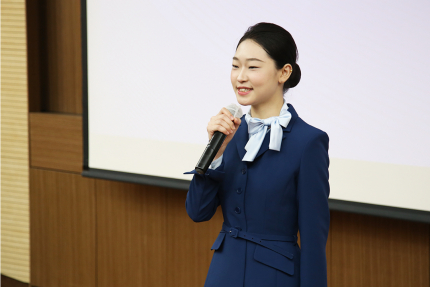
"Department of Service Management, School of Global Studies, Hosts 1st Korean Speech Contest to Foster Communication Among International Students“
On May 27, the Department of Service Management (Korean Track) under the School of Global Studies at Korea Aerospace University hosted the 1st Korean Speech Contest in Room 108 of the Research Building. The event was designed to give international students an opportunity to showcase their Korean language skills and share their cultural perspectives in a natural setting, while also strengthening their sense of belonging within the department. A total of 55 students participated in the event, which was themed “KAUSM World Tour by Air”. They were divided into six teams and delivered Korean-language presentations on a variety of topics. In addition to the speeches, the event featured a rich lineup of performances, including a collaborative opening by Professor Eunjeong Lim, head of the program, and the KAUAO Orchestra. Other highlights included a traditional Chinese dance, contemporary dance, vocal performances, an aviation safety demonstration, and a runway-style fashion show. On stage, students shared their career aspirations, study abroad experiences, and life in Korea — all in Korean. One participant said, “I want to grow into a talented professional for the aviation industry,” and added, “Although I was accepted into a university in China, I chose to study in Korea to gain more specialized knowledge and global competitiveness.” Rather than simply demonstrating their language skills, the students delivered heartfelt and personal stories that resonated with the audience. Many participants admitted that this was their first time taking part in a department event or directly interacting with professors, and initially found it unfamiliar. “In China, we rarely have opportunities to communicate directly with professors or join department-led events, so it felt awkward at first,” some students shared. “But as we prepared for the contest, we gradually became more engaged and were able to truly feel a sense of belonging within the academic community.” In preparation for the event, professors and instructors provided students with detailed guidance, often staying late to help refine their presentations. The students, meanwhile, balanced their speech preparation with various performances, participating in multiple rehearsals. On the day of the event, the stage design, presentation content, and performance quality were all delivered at a high level, receiving an enthusiastic response from the audience. Professor Sugyeong Lee, head of the Service Management program, remarked, “This event served as a starting point for building stronger connections among our students and shaping a unique culture and identity for the program.” She added, “We will continue to develop specialized programs that reflect cultural diversity, so that international students can take a more active role in department activities and grow through these experiences.”
2025-05-30 -
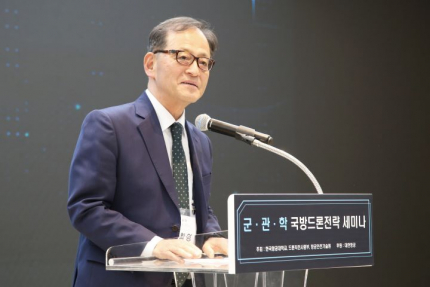
“The Future of Warfare Transformed by Drones” — Defense Drone Strategy Seminar Held by Military, Government, and Academia
On May 26 at 2 PM, Korea Aerospace University held the Defense Drone Strategy Seminar at the Vision Hall on campus.Co-hosted by Korea Aerospace University, the Korea Institute of Aviation Safety Technology (KIAST), and the Drone Operations Command, and sponsored by Korean Air, the seminar aimed to explore the future direction of defense drone development in preparation for future battlefields. It also served as a platform to strengthen collaboration among the military, government, and academia. Drones are rapidly emerging as key assets in military operations worldwide, including surveillance and reconnaissance, precision strikes, communications, and electronic warfare. As they converge with technologies from the Fourth Industrial Revolution, their military applications are expanding even further. In response to these trends, the Republic of Korea's military is actively developing various drone-based strategies. In line with this global trend, the seminar brought together experts from various sectors to share insights on the current status and case studies of domestic and international defense drone technologies. The participants also discussed ways to collaborate in securing core technologies.The seminar consisted of four sessions. In addition to the co-hosting institutions—Korea Aerospace University, the Korea Institute of Aviation Safety Technology (KIAST), and the Drone Operations Command—twelve experts from organizations such as the Agency for Defense Development (ADD), Korea Military Academy, Korean Air’s Aerospace Research Institute, and LIG Nex1 delivered presentations. The presenters covered a range of topics, including:△ practical applications and technological trends of defense drones on the battlefield,△ analysis of the technological level of domestic and international defense drones and strategies for securing core technologies,△ future directions for the military use of drones, and △ an overview of defense drone technologies across industry, academia, and research institutes.Each speaker introduced their institution’s research achievements in defense drone technology and offered insights on the future direction of defense drone development, encompassing both hardware and software perspectives. In particular, professors from Korea Aerospace University proposed key technologies with the potential to fundamentally transform future battlefields. These included the integration of drones with space-based weapon systems, AI-powered combat algorithms, aerial separation and rejoining technologies, and collaborative missions between drones and manned aircraft.They also emphasized that securing these core technologies through a collaborative model involving the military, government, and academia could significantly contribute to building a robust domestic defense drone ecosystem and achieving technological self-reliance. In his welcoming remarks, President Hee-Young Hurr stated, “This seminar was organized for the first time out of a shared recognition of the need for a forum to discuss the latest trends and research challenges in drone technology to strengthen future defense capabilities. I hope today’s event will serve as a meaningful starting point for building a sustainable drone technology ecosystem.” Hwang Ho-Won, President of the Korea Institute of Aviation Safety Technology (KIAST), stated, “The military use of drones, combined with Fourth Industrial Revolution technologies, is a key variable that will reshape the battlefield. Based on our experience in safety certification and the establishment of demonstration infrastructure in the civilian drone sector, KIAST will actively support the defense sector by contributing to the development of operational safety measures and technology demonstration systems.” Following this seminar, Korea Aerospace University plans to continue building a collaborative network with institutions and companies involved in defense drone technologies. The university aims to pursue follow-up initiatives such as regular seminars, joint research projects, and talent development programs in the field.
2025-05-29 -
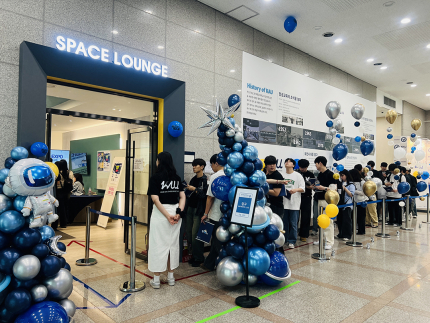
2025 KAU Co-Curricular Expo Showcases Full Range of Programs, Draws Enthusiastic Crowd
The 2025 KAU Co-Curricular Expo, hosted by the Center for Future Education and Innovation at Korea Aerospace University, was held on May 21 from 11 a.m. across multiple venues on campus, including the Vision Hall, Space Lounge, and the Aerospace Museum. The five-hour event, planned and managed by students themselves, featured a wide range of activities and received an enthusiastic response from over 900 participating students, both currently enrolled and on leave, marking a successful and vibrant showcase of KAU’s co-curricular programs. Held under the slogan “Explore Your Dream, KAU EXPO,” the event was designed to boost student interest and participation in co-curricular programs. What made this expo especially meaningful was that it was entirely led by a team of 16 student ambassadors, who oversaw everything from planning and promotion to on-site operations. Their fresh perspective and creativity were fully reflected throughout the event. The pre-event promotions—which included social media content, posters, and interactive activities—were particularly well-received by students, many of whom described them as “innovative and approachable.” At the expo, 11 administrative departments and special programs from Korea Aerospace University set up information booths covering a wide range of topics. In addition, the student-led co-curricular promotion team organized five interactive booths, offering hands-on experiences. Students were able to explore programs related to career development, academic support, psychological counseling, and entrepreneurship, while enjoying engaging activities such as quizzes, games, and mission-based challenges. The event provided a fun and accessible way for students to learn about and connect with KAU’s diverse co-curricular offerings. This year’s expo also expanded its physical footprint, enhancing both accessibility and student engagement. In addition to the Vision Hall on the second floor of the Aerospace Center, the event extended to the Space Lounge on the first floor and the Aerospace Museum, allowing for a more dynamic and inclusive experience. The seamless collaboration between the student promotion team and university departments was a highlight of the event, which went beyond simply providing information to become a hands-on, interactive space for open communication and engagement. Korea Aerospace University’s co-curricular programs are designed to support students’ holistic growth and the development of future-ready competencies. Centered around three key areas—academic skills enhancement, career and employment, and career and psychological counseling—the programs are structured to help students cultivate five core competencies, collectively known as “SPACE”: (S: Global Communication P: Professional Inquiry A: Interdisciplinary Thinking C: Creativity and Challenge E: Ethics and Character) These competencies are carefully integrated across various programs to ensure students develop a balanced and well-rounded skill set. All programs are accessible through the university’s Student Competency Management System and are available not only during the academic semester but also throughout vacation periods. Looking ahead, Korea Aerospace University remains committed to fostering student-led, student-centered co-curricular activities, continuously enriching the learning experience and empowering students to take ownership of their personal and professional development.
2025-05-28 -
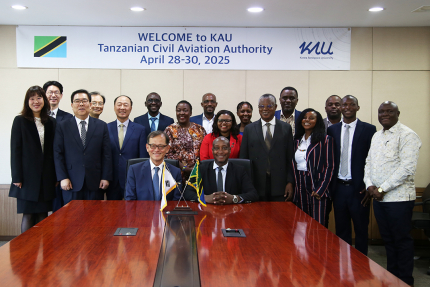
Korea Aerospace University Becomes Tanzania Aviation Education Partner to Start International Cooperation to Train Aviation Professionals
On April 28 and 30, Korea Aerospace University will invite a delegation from the Tanzania Aviation Administration (hereinafter referred to as the delegation) to begin exchange and cooperation to cultivate Tanzanian aviation professionals. The delegation's visit came at the request of the Tanzanian government to strengthen its aviation education capabilities and promote the establishment of a national aviation university by using Korea Aerospace University, which has accumulated aviation education capabilities for more than 70 years as a role model for training aviation professionals. Since Korea Aerospace University awarded an honorary doctorate to Tanzanian President Samia Suluhu Hassan, who visited Korea last year to attend the 2024 Korea-Africa Summit, it has continued to cooperate with Tanzanian government officials to discuss ways to cultivate aviation professionals in Tanzania. The delegation's visit is expected to clarify the direction of such cooperation between the two countries and discuss detailed cooperation measures such as educational advice, joint research, and human exchanges. The delegation, consisting of 10 officials from the Tanzania Aviation Administration (TCAA) and its affiliated Tanzania Aviation Education and Training Center (TCAC), will be welcomed by President Hurr Hee-young and the heads of schools for a two-day official schedule. It will tour various education and research infrastructure and training systems at Korea Aerospace University on the 28th and 30th, and hold a business agreement (MOU) signing ceremony on the 30th. In particular, the MOU will include △Provide training programs for each field of Korea Aerospace University to enhance the capacity of employees of the Tanzania Aviation Administration △ Consultation on the development of aviation education courses at Korea Aerospace University △ Joint R&D in the aviation field △ Mutual cooperation measures in the overall aviation education field such as human exchanges. In his first meeting with the delegation on the 28th, President Hurr Hee-young said, "Tanzania has excellent potential in the aviation industry as the African country with the highest growth potential recognized by the South Korean government," adding, "We are willing to share the experience and knowledge that Korea Aerospace University has gained over the past 70 years to help Tanzania cultivate civilian aviation experts." In response, Astrid Joseph Kanji, director of the Tanzania Aviation Education and Training Center, said, "We hope that this visit to Korea Aerospace University will provide insights on aviation education in Korea and gain a lot of experience and know-how. We hope that the two institutions will build a solid foundation for mutual cooperation that helps each other." Tanzania established the Aviation Education and Training Center (TCAC) in 1985 and produces 1200-1500 aviation professionals across Africa every year. This scale is absolutely insufficient considering the growth potential of the African aviation market with a population of 1.4 billion. Accordingly, the Tanzanian government aims to significantly increase the budget related to aviation education and expand the scale of TCAC, while establishing the Tanzania National Aviation University in the future to develop it into the 'Africa's No. 1 aviation professional training institution'. Tanzania, which is in the early stages of the air transport industry, is evaluated to have sufficient growth potential due to its abundant tourism resources even though it lacks infrastructure or manpower. Korea Aerospace University plans to establish a foundation for strategic cooperation with the African aviation education market by signing a partnership with Tanzania, which aims to become a hub for aviation education in Africa, and consulting directly on aviation education and training in Tanzania. This is also significant in that it is an export of aviation education in Korea to overseas markets. Korea Aerospace University, which aims to become a global aerospace university, is the first Korean university to join ALICANTO*, an international aerospace education organization, in 2023 and interacts with prestigious aerospace universities around the world. It has been selected as a business organization of the "Global Aviation Policy Fellowship" organized by the Ministry of Land, Infrastructure and Transport for two consecutive years from 2024, and has successfully operated a master's degree program in aviation policy for aviation experts in developing countries. From 2020 to 2023, it also operated the "Korea International Cooperation Agency (KOICA)-Korea Aerospace University Master's Degree Program" to produce 74 aviation experts in developing countries. Based on these capabilities and experiences in the field of international aviation education, from the second semester of this year, it will also launch a 1+2+1 multi-degree program to train private pilots in collaboration with Uzbekistan's Tashkent National University of Transport (TSTU). Korea Aerospace University plans to expand its connection with aviation education institutions around the world and strengthen its position as a hub for global aviation education. *ALICANTO: Since its establishment in 2018, more than 40 universities around the world have been active as educational institutions aimed at sustainable development of the aerospace industry and training next-generation aviation experts through cooperation between aerospace education institutions around the world. Member universities are participating in various activities such as educational program development, research cooperation, and policy advice in cooperation with the International Civil Aviation Organization (ICAO).
2025-04-29





